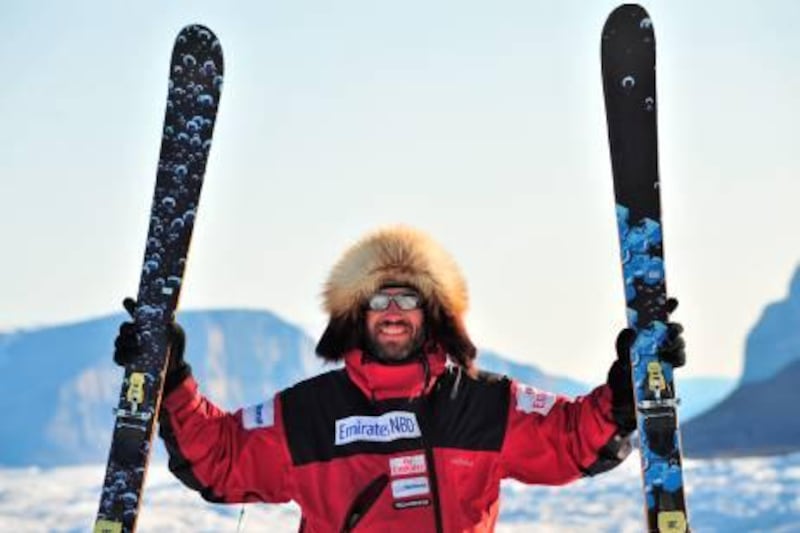I grew up in a national park in New Forest, Hampshire, in the UK. My family owned a hotel there.
My parents were very busy running the hotel. It is a 24-hour, seven-day-a-week business - and you are always exposed and involved in it.
I started out in the hotel washing the dishes after school and on weekends.When I was older, I served behind the bar.
I received pocket money for the work I did and I always saved. Saving our money was the general thing that we grew up with.
Starting work so early has helped me as an adult, with the one proviso: I have never been short of money, but I had to live beyond my means when I got sucked into property. For the first time in my life, I faced a downfall.
I left school with five GCEs, but I didn't go to university. Instead, I did a diploma in hotel management, then travelled the world doing a variety of jobs: builder's labourer, farmer and even a refuse collector. It was my university of life, and I worked in places like Norway and New Zealand.
The money I earned paid for my travels and other adventures, such as parachuting, scuba diving and mountaineering. I was good with my hands, whether it was for manual work or playing the guitar.
I stopped travelling and returned to the UK and decided to join the British army because it would pay me to do the things I love, including mountaineering and skydiving. I wanted to join the elite unit - the SAS, or Special Air Service - but couldn't, so I became a Special Forces reservist full time. I was in that for two-and-a-half years and in my spare time, I was working as a bricklayer.
I then got a commission at the Royal Military Academy Sandhurst, where I trained as an officer and joined the Ghurkas. I was accepted with the minimum qualifications and got in on my GCEs. I served in the UK, Nepal, Hong Kong, Brunei and Oman.
I left the army in 1993, then did an MBA in finance and got a job in marketing in the UK.
In 1995, I moved to Dubai to work for Ducab, the power cable manufacturer, and was with them for five years. I then worked for Airbus Middle East as a regional sales director for six years. During my time there, I was responsible for selling or placing nearly 200 aircraft in the Middle East region.
It was a big move when I left Airbus. I stepped out of my comfort zone and left a job that I loved. What really galvanised me was the personal development world and I was inspired [in this field] by Robin Sharma, a leadership adviser and author, who I had heard give a speech in 1997. If I look at the three defining events in my life, they would be attending officer training school at Sandhurst, climbing Mount Everest in 2006 and doing a CTI leadership programme.
Sandhurst was the best education I ever had, but the leadership programme gave me the feeling that I could achieve anything.
Such was my state of confidence, I did the North Pole and South Pole in 2007. The two poles were huge and harder than Mount Everest.
It cost a lot to get to the North Pole and the South Pole.
We are talking well over US$100,000 (Dh367,310) for each expedition. I call this the business of adventure. They have become a commercial venture and I now have an agent because I am representing to a bigger level. In the beginning, I spoke to journalists and knew what coverage we could get as nobody had done it in the region.
I did my business plans and the sums very carefully, guaranteeing sponsors, including Land Rover, Emirates NBD and Emirates Airline, a certain sum in coverage on each major expedition. Each time we've exceeded that sum by between four and 10 times - the coverage we received from the Greenland Quest last year ran into millions of dollars.
It is a lot more serious than when I first started with my Everest expedition.
The world of adventure is as competitive as most businesses. When your first trip is done, you are seeking publicity and sponsorship or records or a historical element. Adventurers are quite secretive with their plans as there is copying. On my side, I am different from serious adventurers because I have been in the corporate world and am a professional coach, motivational speaker and do real-team coaching.
With Greenland, I've never worked so hard in all my life. I am really leveraging sustainability and for me, getting the sponsors, doing the planning and preparation are hard work.
Once you are there, it is also physically hard work. But I prefer to be there, in a total zone and away from everything, even though physically you are exhausted.
Adventure is a business and I'm lucky enough to be doing this, that I love it and am good at it.
* As told to Felicity Glover






